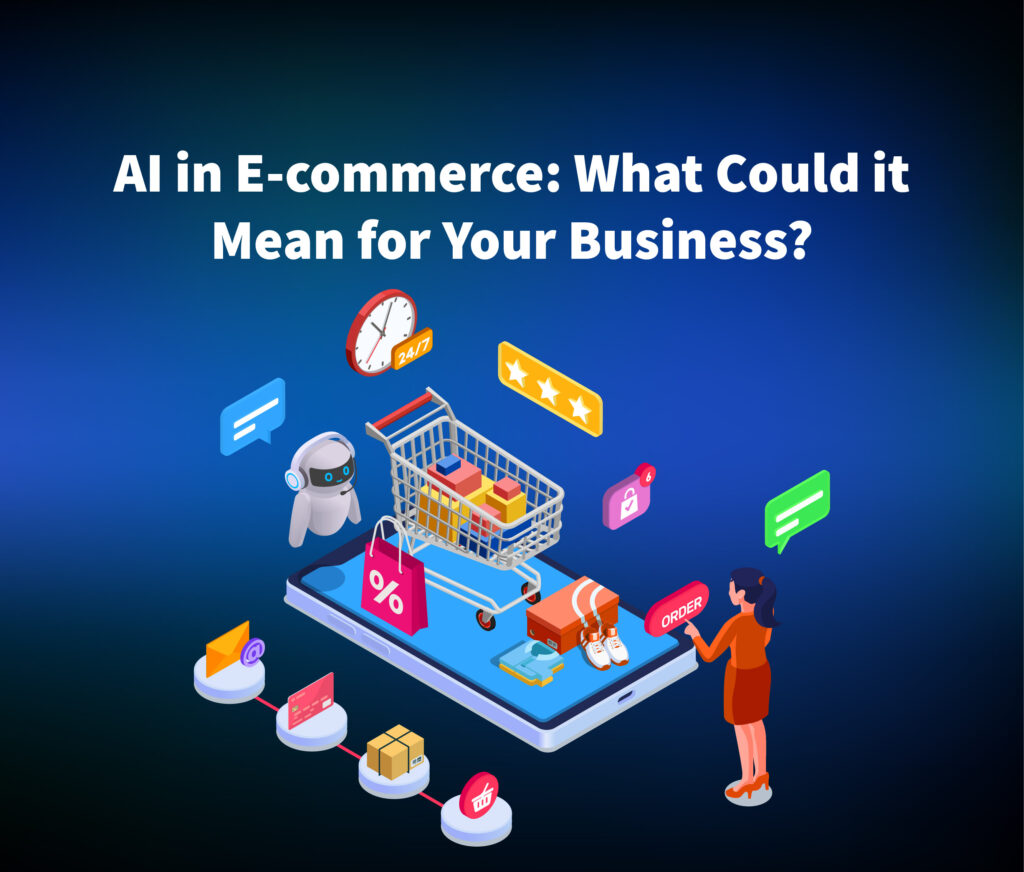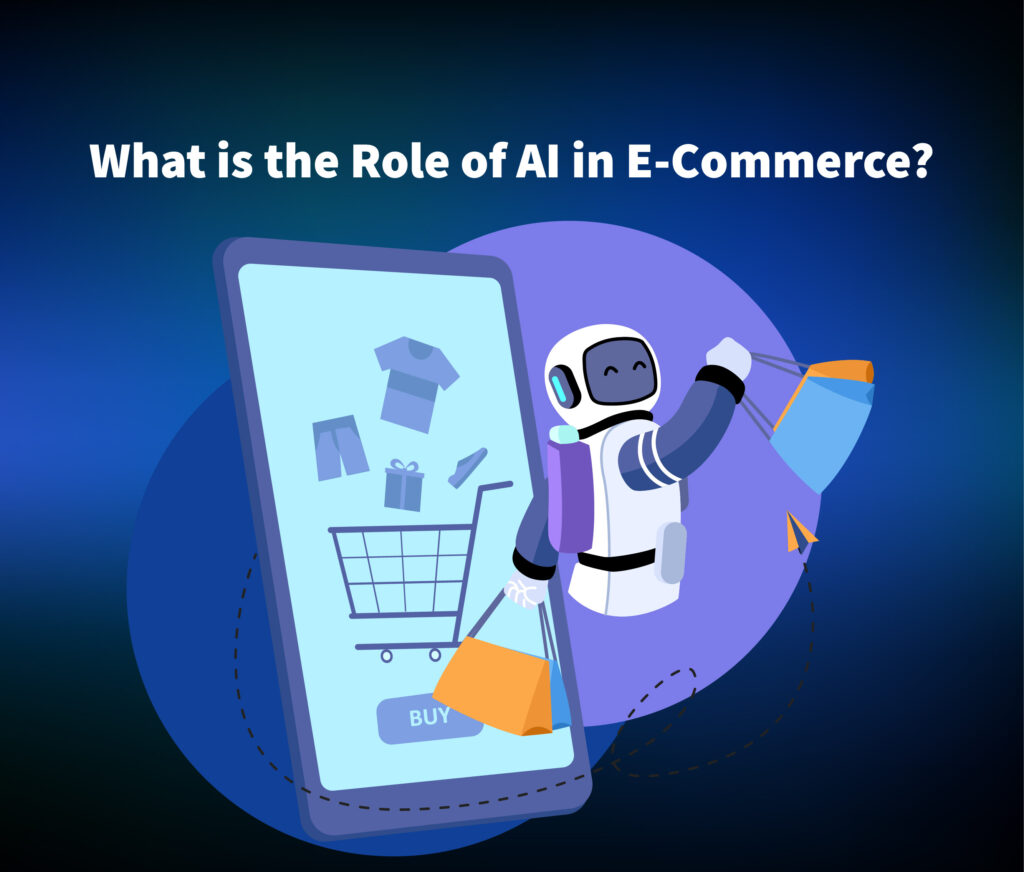Every time the words “artificial intelligence (AI)” reach our ears, our instinctive thought is to imagine an extravagant plot device that is usually showcased in science fiction literature and films. Nevertheless, in the realm of e-commerce, AI primarily centers around algorithms and advanced learning technologies that form the basis for automation and numerous other functionalities.
AI plays a crucial role in enhancing the customer and user experience in the e-commerce industry, as well as enabling online retailers to make informed business decisions based on customer data. This article provides valuable insights into the various impactful ways in which AI in e-commerce can revolutionize online shopping.
Let’s dig in!
AI in E-commerce: What’s in Store?
AI is rapidly transforming the e-commerce industry, acting as a catalyst for significant changes in business operations.
Let’s explore how leading e-commerce giants, such as Amazon, Alibaba, and eBay, are utilizing artificial intelligence (AI) to bolster their competitive advantage and achieve remarkable outcomes.
Amazon, renowned for its forward-thinking approach, harnesses the power of AI-driven Alexa to comprehend customer preferences and deliver tailored product suggestions. In fact, research indicates that a remarkable 35% of Amazon’s overall sales can be attributed to its recommendation system.
Incorporating AI in e-commerce, JD.com, a prominent e-commerce company based in Beijing, has partnered with Siasun Robot & Automation Co Ltd. to revolutionize its warehouse operations with automated systems. The company aims to use generative AI and robotics to optimize product sorting and delivery, reducing costs and boosting revenue. Additionally, it plans to trim its manual workforce from 120,000 to 80,000 with AI-driven efficiency improvements over the next decade.
Alibaba, a major e-commerce player, uses AI assistants like Tmall Genie and Ali Assistant to gain a competitive advantage. Its AI chatbot handles 95% of customer inquiries, and it applies AI for smart recommendations, improved search, and efficient logistics, resulting in 10% less vehicle use and 30% less travel distance.
eBay, another popular e-commerce platform, has introduced Shopbot, a shopping assistant powered by artificial intelligence. This innovative tool aids users in discovering suitable products by providing accurate information through text, voice, or image uploads.
AI in E-commerce: What Could it Mean for Your Business?
 63% of customers are unaware that e-commerce platforms use AI, which means AI can be integrated into your e-commerce site without your knowledge, according to a survey carried out by Hubspot.
63% of customers are unaware that e-commerce platforms use AI, which means AI can be integrated into your e-commerce site without your knowledge, according to a survey carried out by Hubspot.
McKinsey & Company, in collaboration with the Retail Industry Leaders Association, outlined seven imperatives for reimagining retail in 2021, and each of them could potentially benefit from AI-powered technologies in some capacity.
Here are some major benefits of AI in e-commerce, along with examples.
1. Precision Marketing and Targeted Advertising
Retailers prioritize personalization, but only 15% have fully implemented it across channels. Distinguish yourself by delivering tailored messages and one-on-one customer interactions. AI and machine learning now enable deep personalization through data analysis, allowing you to understand customer preferences and deliver resonating messages.
2. Enhanced Customer Loyalty
Targeted marketing and personalized advertising can boost customer retention. McKinsey found that omnichannel personalization strategies have the potential to increase revenue and retention by 10-15%.
3. Effortless Automation
Automation aims to minimize human involvement in tasks, from scheduling emails to using tools like Zapier. Future e-commerce trends, like robotics and machine learning, are gaining substantial attention. AI-powered product recommendations can greatly assist by automating tasks, such as loyalty programs and basic support in online stores.
4. Seamless Sales Operation
AI can streamline your sales process by collecting customer data, automating cart follow-ups, and utilizing chatbots for basic inquiries, making it easier to guide customers through the funnel.
What is the Role of AI in E-Commerce?
 AI has several key roles in e-commerce, impacting different aspects of online shopping. This is how it plays a crucial part:
AI has several key roles in e-commerce, impacting different aspects of online shopping. This is how it plays a crucial part:
● Customer Behavior Analysis:
AI helps businesses analyze customer behavior by using machine learning algorithms to process large amounts of data and identify trends, preferences, and buying patterns. This information improves personalization, product recommendations, and customer satisfaction.
● Personalized Shopping Experience:
AI has the ability to enhance customer shopping experiences by suggesting products based on their individual preferences and purchase history. This can result in more engagement, higher conversion rates, and increased customer loyalty.
● Chatbots and Virtual Assistants:
AI chatbots and virtual assistants offer immediate customer support and help, handling queries, sharing product details, and processing transactions. They operate round the clock, enhancing customer service and minimizing the need for human involvement.
● Fraud Detection and Prevention:
AI is essential for spotting and stopping e-commerce fraud. By using machine learning algorithms, transaction data is analyzed instantly to detect any suspicious activity, ensuring that both businesses and customers are protected and the e-commerce platform remains secure.
● Pricing Optimization:
Employing AI-driven pricing strategies, which leverage algorithms to scrutinize market dynamics, competitor product pricing, and customer demand, enables businesses to fine-tune product pricing. This dynamic adjustment based on real-time data allows for the maximization of revenue and profitability.
Wrapping Up
While tomorrow’s AI may seem like a cinematic vision, AI technology is already in use today, albeit in a less glamorous way. AI integration enhances customer experiences, boosts conversion rates, and streamlines business operations.
o provide an exceptional shopping experience on your ecommerce website, harness the power of AI in e-commerce. This technology can help you leverage customer and business data more effectively to succeed in the marketplace.


